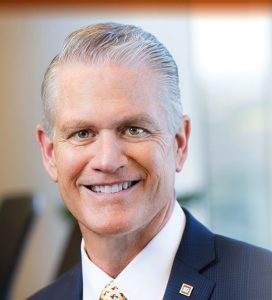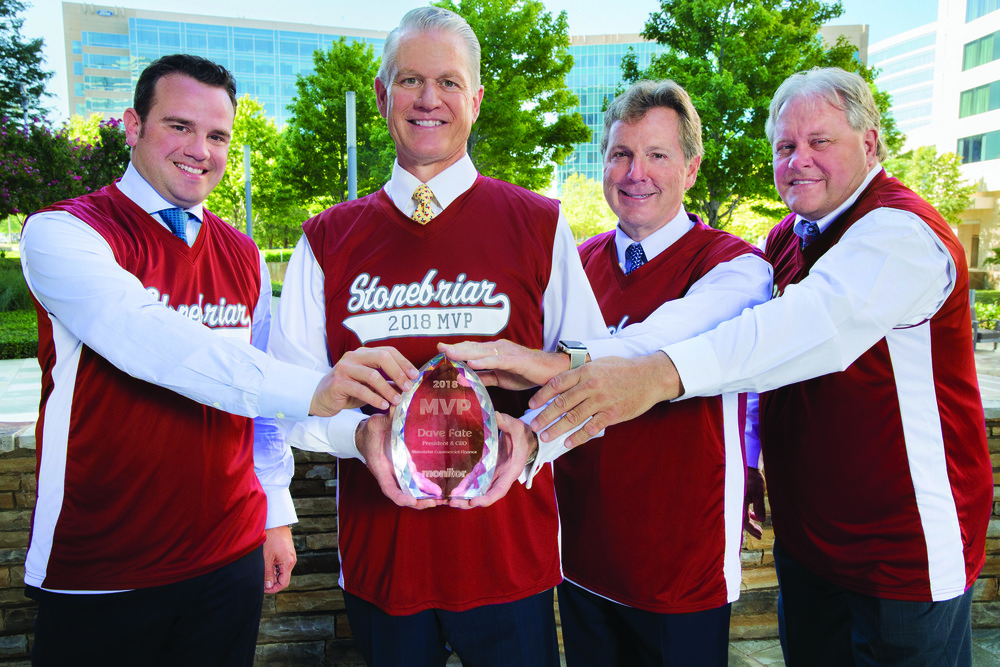While we planned the first annual MVP Award, Monitor’s publisher, Jerry Parrotto, was struck by a quote from NFL legend Peyton Manning: “The most valuable player is the one who makes the most players valuable.”
This quote became the touchstone in our MVP selection process. The outpouring of support we received for the Monitor 100 company leaders was phenomenal, which made selecting a winner a true challenge. After much deliberation, Dave Fate, president and CEO of Stonebriar Commercial Finance, emerged as a leader who lives up to Manning’s definition of an MVP.
The last time I interviewed Fate, his goal was to turn then start-up Stonebriar into a multi-billion dollar, best-in-class, diversified commercial finance company with multiple platform businesses. In three and half years, Stonebriar has made significant progress toward that goal, launching General Equipment, Rail Leasing, Aviation Capital and Real Estate platforms and currently reporting nearly $2.0 billion in equipment-related net assets.
Diversified Funding Sources

Initially, Stonebriar’s funding source was a strong equity partner along with its affiliate, Security Benefit Life, which offered patient, reliable, long-term capital. Beginning 14 months after inception, Stonebriar closed four equipment-backed securitizations — the most recent issued with a AAA rating — and recently closed $1 billion in revolving credit facilities with Bank of America, Credit Suisse, Goldman Sachs and Security Benefit Life.
“If there is one thing we’ve learned over 30+ years and multiple economic cycles, you can never have enough financial flexibility on the right side of your balance sheet,” Fate says, pointing to the 2008 financial crisis. “We will continually look to diversify our funding sources and work to drive down our cost of capital. Quality of capital is the key to long term success in this business.”
According to a Reuters report, “Stonebriar was probably the youngest issuer ever to come to the ABS market” with its initial 2016-1 deal.1 The hybrid pool of large-ticket assets — including aviation, marine transportation, energy, construction and manufacturing equipment — made the deal unique and initially challenging for investors to understand.
“Stonebriar’s entry into the ABS market introduced a new product,” Fate says. “It was hard work. We were building a business by day and developing a new securitization model at night. We took every meeting. We met with every potential investor. Creative thinking, strong bankers at Credit Suisse and the team’s 25-year history of success were the keys to sprinting from a cold start to a successful issuance of $252 million of securitizable assets 14 months later.”
It’s About the People
Fate attributes these accomplishments to the most important factor in Stonebriar’s success — its people. “We launched Stonebriar with six highly talented individuals. We just needed the right six people day one it’s always about the people. We carefully and strategically built the team from there and are continually scouting to upgrade the talent on our roster. Fresh talent means fresh perspectives. We never stop learning.”
Stonebriar is very efficient. No. 1 in Monitor’s 2018 Top Private Independents Volume/Employee Productivity ranking, Stonebriar’s staff created $25.89 million in new business volume per employee in 2017.

Generational Depth
The practice of grouping people by age, which began during the Industrial Revolution, has continued in most U.S. businesses and schools. But according to a Harvard Business Review report, this practice “constitutes a missed opportunity for combining the unique assets of age and youth in the workplace”.2 At Stonebriar, each department has an intentionally age-integrated team. “We feel very good about the organization’s future state,” Fate says. “Our ABS investors see that, our banks see that and our equity partners see that. I am excited to see what this company will look like in 10 years and beyond. It’s a marathon.”
To keep a business thriving for the long haul, Fate says it’s essential to invest time and energy in developing young talent. Stonebriar calls this Project 30, but Fate began this initiative during his time with AIG Commercial Equipment Finance.
“We learned early to cross train entry-level hires across all functions in our organization. They would spend 90 days or more learning the basics in each department,” he says of AIG’s informal program. “These recruits would come in without a clear picture of their career trajectory in our organization. Our rotation program helped both management and each new hire find the right fit. It was a win-win. They were smart young people, hungry for success.”
When the financial crisis hit, these young people had developed a broad skill set from the multi-discipline training that would make them stand out among other job seekers in the market. And when the future of AIG became uncertain, Fate encouraged them to reach for bigger and more challenging jobs. “I made it my mission to help those kids land in good spots in an uncertain economy at the time. They were very grateful for our efforts at the time and still reach out to us from time to time to express that appreciation,” he says.
Fate has continued this cross-functional approach at Stonebriar. When searching for new talent, he encourages his team to avoid getting hung up on prior job functions. Instead, he asks, “Is this a talented person? Do they fit into the culture and can they add value to Stonebriar? If they can, then that’s someone we need to be talking to, and it’s up to us to figure out if we can put them in an environment to be successful.
“At the end of the day, it is about paying it forward. We all had mentors, and most of us can point to that person who gave us our first opportunity that shaped our careers. It’s our time to do that for the next generation of leaders in our industry.”
With that goal in mind, Fate has several pieces of advice for aspiring MVPs:
1. Ask Questions, Then Listen
Fate says asking someone what they think, and then learning to slow down and really listen to their responses is an essential skill. “You can learn something from everybody,” he says. “My dad taught me that when I was a kid. It doesn’t matter who they are, you can always learn something from them. Just listen.”
According to an employee who nominated him, Fate is “master negotiator.” He attributes this ability to his listening and observation skills. “Listening and observing are keys to many things and negotiating is one of them,” he says. “When I really listen to what a person is saying by encouraging him or her to help me understand their perspective on an issue — goals, positives, negatives, constraints — I am much better equipped to find common ground.”
2. Take Every Meeting
Another one of Fate’s favorite mantras is “never turn down a meeting” even if you think it might be a waste of time. “You just never know,” he says. “You only have so many opportunities to establish a relationship. Some relationships turn into life-long friendships or strategic partners in business or both. It’s not always about a deal. If you establish relationships, opportunities follow, business and otherwise. They always do. It’s a marathon.”
Fate encourages his team to make relationships a priority. He coaches new hires to learn that skill early in their careers. “Introduce yourself to everyone in the room. People like to talk and generally like to help when they can. Take the time to know what they’re about, where they came from, their backgrounds and what they do,” he says. “It is an extremely valuable skill that will pay dividends for years to come.”
3. Multi-Dimensional Thinking Matters
Fate says customers call Stonebriar because his team can react quickly, creatively and reliably. “It’s because our people are so good at thinking outside the box,” he says. “We don’t always color within the lines. We think multidimensionally. No deal in our space is easy. Our job is to figure out how to meet our customers’ needs by finding solutions. We can quickly differentiate the perceived risk from the real risk and structure the transaction to satisfy the customer while protecting Stonebriar’s investment.”
Fate’s team says his “insatiable thirst for information and knowledge” is an important aspect of his ability as a leader, and he admits to consuming a “tremendous” amount of data each day. “I encourage my team to learn how to think independently,” he says, “Gather as much information from as many sources as possible and learn to formulate your own opinions from reliable data points.”
4. Communicate, Then Empower
Fate wants every person at Stonebriar to be on the same page. He has company-wide meetings each quarter where he sits down with his team for an overview of the business including a discussion of financial results. “Every employee should understand how their job function and individual performance affects the bottom line,” he says. His advice to leaders is to empower employees: “Lead by example, have passion, have energy and communicate,” he says. “Be good to your people and empower them. Delegate, measure them, hold them accountable and get the hell out of their way. Employees who are empowered and respected are happy and productive.”

5. Life Events Matter
Fate’s role as a husband and father has helped him ensure Stonebriar’s culture embraces employees’ life events. “You’re going to have different life events in your 30s, 40s and 50s, and you want to be available for all of them. You can never recreate your kid’s first day of kindergarten,” he says.
Fate encourages his employees to manage their own time and schedule. “We don’t punch a clock. We expect a lot from our employees, but we give them the freedom to balance work and family life as they see fit. That lets them take ownership. They want to own it and be responsible. At the end of the day, this gives us an energetic and fun work environment.”
Fate makes time for his own life events, too. Although he and his wife have an empty nest these days, they often travel to attend Ole Miss volleyball games to cheer on their daughter. “Can I still manage the business and do what I need to do when I’m on the road?” he asks. “Sure. I do it all the time.”
To ensure a happy home life, Fate draws a line between work and family. “Don’t take work issues home with you,” he advises. “Instead, take some time to focus on your family, friends and yourself. We all need down time. It leads to a healthy work/life balance.”
Fate was lucky to have mentors who modeled these skills. “My mentors in this industry took me under their wing, and I saw how the successful ones conducted their work life and their personal life. Their people were working hard, having fun and playing hard, too. When you love what you do and the people you get to do it with, life is good. Those examples were great lessons for me.”
Ongoing Evolution is Essential
Although Stonebriar has already achieved critical mass, Fate and his team will not be resting on their laurels.
“Now that we have an almost $2.0 billion balance sheet, we can think about our future state with more clarity and creativity as we continue to evolve,” he says. “We are diversifying funding sources and getting into other businesses, product lines and joint ventures. But the macro goal will never change. We’re building a best-in-class, diversified commercial finance and leasing company. It’s fun to be different in the marketplace today. We’ll let our results do the talking, and it’s getting easier and easier to do that every day. I’m proud of the organization we have built and the team responsible for building it.”
1 Harrison. “Stonebriar CEO has plans for more deals after ABS success.” Reuters. Feb. 2017.